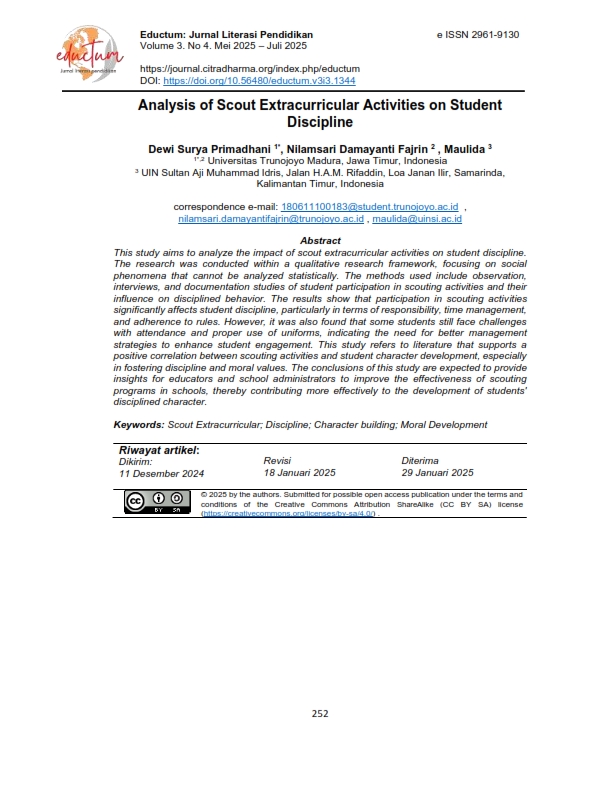Analysis of Scout Extracurricular Activities on Student Discipline
DOI:
https://doi.org/10.56480/eductum.v3i4.1349
 Abstract View:
Abstract View:
39
 PDF downloads:
PDF downloads:
20
Keywords:
Scout Extracurricular, Discipline, Character building, Moral DevelopmentAbstract
This study aims to analyze the impact of scout extracurricular activities on student discipline. The research was conducted within a qualitative research framework, focusing on social phenomena that cannot be analyzed statistically. The methods used include observation, interviews, and documentation studies of student participation in scouting activities and their influence on disciplined behavior. The results show that participation in scouting activities significantly affects student discipline, particularly in terms of responsibility, time management, and adherence to rules. However, it was also found that some students still face challenges with attendance and proper use of uniforms, indicating the need for better management strategies to enhance student engagement. This study refers to literature that supports a positive correlation between scouting activities and student character development, especially in fostering discipline and moral values. The conclusions of this study are expected to provide insights for educators and school administrators to improve the effectiveness of scouting programs in schools, thereby contributing more effectively to the development of students' disciplined character.
References
Anwar, M. F., Ruminiati , & Suharjo. (2017, Oktober). Pengembangan Modul Pembelajaran Tematik Berbasis Kearifan Lokal Kabupaten Sumenep Kelas IV Subtema Lingkungan Tempat Tinggalku. Jurnal Pendidikan; Teori, Penelitian, dan Pengembangan, 2(10), 1291-1297. https://doi.org/10.53625/jcijurnalcakrawalailmiah.v2i6.5148
Barlian, Ujang Cepi, dan Siti Solekah. “Implementasi Kurikulum Merdeka Dalam Meningkatkan Mutu Pendidikan”. JOEL: Journal of Educational and Language Research 1, no. 12 (2022): 2105–18. https://doi.org/10.58218/literasi.v2i1.492
Farida, Zulaikha , & Putro, H. E. (2020, September). Desentralisasi Wisata Religi Indonesia Melalui City Branding Wisata Kabupaten Bangkalan Madura. Jurnal Magister Ilmu Komunikasi, 6(2), 223-234. https://doi.org/10.30813/bricolage.v6i02.2149
Luzyawati. Lesy. (2017). Analisis Kemampuan Berpikir Kritis Siswa SMA Materi Alat Indera Melalui Model Pembelajaran Inquiry Pictorial Riddle. Universitas Wiralodra. https://doi.org/10.23971/eds.v5i2.732
Masyhudunnuri. (2021). Madrasah Diniyah: Kearifan Lokal dalam Pendidikan Keagamaan di Kabupaten Bangkalan. Jurnal Biokultur , 67-81. https://doi.org/10.20473/bk.v10i1.27798
Mustaghfiroh, Siti. “Konsep merdeka belajar perspektif aliran progresivisme John Dewey”. Jurnal Studi Guru Dan Pembelajaran 3, no. 1 (2020): 141– 47. https://doi.org/10.30605/jsgp.3.1.2020.248
Mubarak, Sobilan, dkk. 2020. Pengembangan Modul Pembelajaran Tematik Melalui Problem Based Learning, Jurnal Instruksional. Vol. 3, No. 1, Hal. 57-65. https://doi.org/10.24853/instruksional.3.1.57-65
Munawaroh, Siti Rossidatul; (2017) Pengembangan Modul Ipa Berbasis Kearifan Lokal Pembuatan Tahu Tamanan Pada Pokok Bahasan Tekanan Dalam Pembelajaran Ipa Di Smpn 1 Tamanan. FKIP UNEJ e-PROCEEDING, 8 dec. 2017. ISSN 2527-5917. https://doi.org/10.19184/jpf.v7i1.7221
Nasir, Muhammad. “Pengembangan kurikulum muatan lokal dalam konteks pendidikan islam di madrasah”. HUNAFA: Jurnal Studia Islamika 10, no. 1 (2013): 1–18. https://doi.org/10.24239/jsi.v10i1.12.1-18
Sihombing, Lisbet Novianti, dkk. 2023. Buku Model Pembelajaran Berbasis Masalah Bermuatan Karakter untuk Meningkatkan Keterampilan Berpikir Kreatif. Bandung: Widina Bhakti Persada. https://doi.org/10.35542/osf.io/hej6x
Siswanto, R. D., & Ninawati, M. (2021). Keefektifan Buku Teks Tematik Berbasis Kearifan Lokal Terhadap Hasil Belajar Siswa Sekolah Dasar. Jurnal Publikasi Pendidikan, 11(1), 36-41. https://doi.org/10.26858/publikan.v11i1.18924
Sugiyono. (2019). Metode Penelitian Kuantitatif, kualitatif dan R&D. (Sutopo, Penyunt.) Bandung: Alfabeta . Sukmadinata, N. S. (2013). Metode Penelitian Pendidikan. Bandung: PT. Remaja Rosdakarya https://doi.org/10.21070/2022/978-623-464-047-2
Suhendra, Odang, dkk. 2020. Journal of Education and Counseling: Pengembangan Modul Berbasis Masalah Pada Materi Sistem Pencernaan Makanan Untuk Meningkatkan Kemampuan Berpikir Kritis Siswa. Vol. 2, No.1, Hal.132 - 149.
Wagiran. (2011). Pengembangan Model Pendidikan Kearifan Lokal dalam Mendukung Visi Pembangunan Provinsi Daerah Istimewa Yogyakarta 2020 (Tahun Kedua). Jurnal Penelitian dan Pengembangan. IV(3). Hlm. 1- 29. https://doi.org/10.47467/reslaj.v6i11.3371

Downloads
Published
How to Cite
Issue
Section
License
Copyright (c) 2025 Dewi Surya Primadhani, Nilamsari Damayanti Fajrin, Maulida

This work is licensed under a Creative Commons Attribution-ShareAlike 4.0 International License.
Authors who publish with this journal agree to the following terms:
- Authors retain copyright and grant the journal right of first publication with the work simultaneously licensed under a Creative Commons Attribution-ShareAlike 4.0 International License that allows others to share the work with an acknowledgment of the work's authorship and initial publication in this journal.
- Authors are able to enter into separate, additional contractual arrangements for the non-exclusive distribution of the journal's published version of the work (e.g., post it to an institutional repository or publish it in a book), with an acknowledgment of its initial publication in this journal.
- Authors are permitted and encouraged to post their work online (e.g., in institutional repositories or on their website) prior to and during the submission process, as it can lead to productive exchanges, as well as earlier and greater citation of published work (See The Effect of Open Access).

This work is licensed under a Creative Commons Attribution-ShareAlike 4.0 International License.













